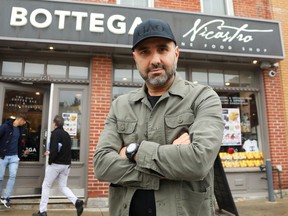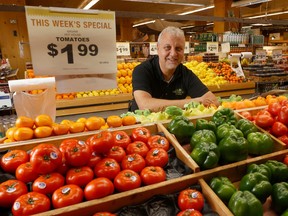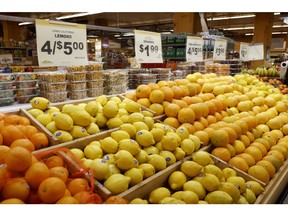While some Canadians pledged to boycott Loblaw-owned stores for the month of May, the boycott is being extended by organizers “indefinitely.”
Article content
While a nationwide boycott of Loblaw-owned grocery stores is extended by its organizers, some independent grocers in Ottawa have noticed a boost in sales.
Organized in an 80,0000-member group on the social media platform Reddit, some Canadians pledged to boycott Loblaw-owned stores for the month of May, due to mounting frustrations with higher food prices and a lack of competition in the grocery sector.
Article content
This week, the group announced the boycott would continue indefinitely.
“Over the coming months, boycott organizers will focus on empowering consumers through education on key topics and engaging in advocacy efforts to garner political attention and raise awareness via social media challenges,” a social media post reads.
Advertisement 2
Article content
While food inflation has been an industry-wide phenomenon, sparked by global pressures like gas prices and the war in Ukraine, for many, Loblaw has become the poster child for high prices in Canada.
Pat Nicastro, owner of La Bottega Nicastro, says he’s noticed more foot traffic to his Italian grocery store in the ByWard Market. He says he’s not sure if it can entirely be attributed to the Loblaw boycott, as it’s always a busy time of year.
Independent grocers don’t have the same buying power as the massive “big five” names: Loblaw, Empire (Sobeys), Metro, Walmart and Costco.
But, Nicastro says, independent grocers can have lower overhead costs and don’t always charge suppliers back-end fees.
“We don’t charge any of that stuff to suppliers. So we can sell the same, or less, as most chain stores,” he said in a recent interview. “For us, it’s worked to our benefit.”

Frustrated by high prices at the big-box stores, consumers might be noticing local grocers have competitive prices for certain products, he said.
“A lot of times, consumers are fooled by big box stores, thinking that the prices are a lot better,” he said. “People are a lot more aware of prices, and we see that. We know we can compete with all the big supermarkets on anything Italian, we’re confident about it. We’re seeing people, and they’re looking, they’re noticing, ‘Hey, wait a second, you’re as competitive, or better.’”
Advertisement 3
Article content
Alfonso Curcio has owned Farmer’s Pick on Prince of Wales Drive since 1992. He said he’s seen a spike in grocery sales since the boycott started — but “not as much as you’d think.”
A boycott, he says, won’t stem the tide of massive grocery chains buying up small and medium-sized independently owned businesses, leaving Sobeys, Metro and Loblaw controlling the lion’s share of Canada’s grocery industry.
“They either squash you out, or they buy you up when you get big enough. That’s the pattern,” he said. “They’ll open up across the street and sell things below cost so eventually, the independents won’t be able to survive.”

Over the years, he’s watched small corner stores leave his Rideauview neighbourhood, with shoppers instead opting to get their staples from a nearby Shoppers Drug Mart. The chain of drug stores was purchased by Loblaw in 2014, and is also on boycott organizers’ list.
With dwindling local options, Curcio says the Loblaw boycott could simply mean people are instead opting to buy their groceries from one of the other major grocers.
He counts himself as “a stubborn guy who works eight days a week,” and, like Nicastro, works with smaller suppliers that don’t do business with the big chains.
Advertisement 4
Article content
A lot of suppliers are controlled by “the big guys,” as Curcio calls them, “because they know they’re the lion’s share of business,” and charge suppliers listing fees and advertising fees.
“It’s a big investment for a small guy to get into a chain store,” he said. “But they love smaller brands. We work with them. There’s less layers, we get better pricing.”
But sometimes Curcio is forced to buy merchandise from Loblaw-owned distributors in order to get some popular name-brand products and keep his loyal customers happy — and away from the big chains.
“Their wholesale sells to all their stores in their network. So we buy from both Sobeys and Loblaw, because the manufacturer stopped selling to us,” he said. “I have to bring in that product, because Mrs. Smith wants her Danone yogurt.”

Not every independent grocer is seeing a change in sales during the boycott, though.
Victoria Chang, owner of Kowloon in Chinatown, says her specialty Asian grocery store can’t compete with the big box stores.
“They are so powerful,” she said. “(the boycott) is not really affecting us,” adding, if anything, this year is “a little hard,” largely due to inflationary pressures.
Advertisement 5
Article content
“Everything we get from the supplier, every time, there’s a change in the price,” she said. That’s coupled with a decrease in purchasing power among consumers.
The Bank of Canada announced an annual inflation rate of 2.7 per cent in April, a three-year low. The rate of inflation hit a four-decade high of about eight per cent in June 2022.
Despite cooling inflation rates, almost two-thirds of Canadians feel that inflation at the grocery store is getting worse, a new poll suggests.
A new Leger survey found that almost 30 per cent of Canadians believe food inflation has been primarily caused by grocery stores trying to increase profit margins. Another 26 per cent think it’s mostly due to global economic factors, while one in five blame the federal government.
Inflation on groceries was 1.4 per cent in April and helped drive overall inflation lower to 2.7 per cent, Statistics Canada said. However, even low inflation still means prices are going up. Over the past three years, grocery prices have risen 21.4 per cent, according to the agency.
Advertisement 6
Article content
Per Bank, Loblaw president and CEO, said last week the company was ready to sign a grocery code of conduct. The code has been developed by a group of leaders in the food industry, with the intention of evening the playing field for suppliers and smaller retailers.
Loblaw and Walmart Canada said last winter they wouldn’t sign the voluntary code because they were concerned it would raise prices for shoppers.
The negotiations over the code predated the boycott, Bank told The Canadian Press, so the announcement “has nothing to do with their demands.” But he recently had a meeting with boycott organizer Emily Johnson, and said he’s sure she will be happy to hear that Loblaw has agreed to the code.
Curcio, though, calls the code of conduct “too little, too late.”
“What are they going to do differently?” he said. “They control the entire grocery market. I can’t see how they’re going to curve that. It’s too late.”
With files from The Canadian Press
Recommended from Editorial
Article content



